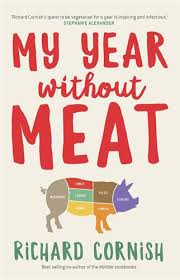Synopsis (From GoodReads):
When food writer Richard Cornish was so overcome by the aroma of the roast leg of lamb he had buckled into the passenger seat next to him that he pulled over to the side of the road and tore it apart with his bare hands, he knew he had a problem. He began to examine what it means to eat meat by becoming vegetarian for a year. My Year Without Meat is a surprising and bittersweet journey that changed Richard's body, his values and how he cooks. It's a meditation on ethical meat, an ode to vegetables and a cautionary tale about our relationship to food—as told by a self-confessed meat lover. It will make you rethink the contents of your supermarket trolley, how you prepare your evening meal and where your food comes from.
Review:
I picked this up from NetGalley for a very personal reason. My teen daughter is a vegetarian. She has been since I mistakenly asked her to help me in the kitchen two years ago and asked her to cut up some chicken. So, I have come to appreciate, first hand, how people are dismissive of vegetarians. I think we omnivores are uncomfortable around vegetarians because perhaps we are afraid of being judged or lectured to about the evils of the meat industry. That can be a valid concern. I read this book really hoping to understand these issues better.
What I liked:
Recipes:This book has several chapters that are a celebration of vegetables! One of the basic concepts in this book was learning to eat with the season. I think many of us understand that idea for Spring produce, but it is harder to put into practice during Fall and Winter. There are many delicious sounding recipes for each season that I will be trying in the future.
Journalistic Approach:
I liked that writer Richard Cornish used his skills as a food journalist to really investigate some issues in the food industry. He gave a (mostly) balanced view of the many issues with meat and dairy production. He also spent considerable amount of time showing the problems facing vegetarian consumers as they try to navigate the many processed protein options available. There are many of these products that are as over-processed and use questionable manufacturing methods as traditional meat producers. I appreciated that he shed light on this.
His own relationship with meat:
The writer shares his personal dilemma of loving meat and cheese while learning the full means by which these product come to our table. It can be an ethical quagmire. There are no easy answers here, just an acknowledgment of the struggle.
What I Didn't Like:
Although her tries, the writer does come off (at times) as an elitist about food. He talks a lot about how one should get their meat and dairy from small, ethical farms. But he doesn't really acknowledge that the vast majority of people have a limited budget. The choices he advocates are very expensive. Of course, in an ideal world, we would all love to eat organic vegetables and meats from farmers who give the animal the best life (and death) possible. But that is not practical for most of us. He also doesn't understand that most people do not have hours to prepare meals. Most people get home from work and must put food on the table in less than an hour. We've got kids to feed, and homework to supervise. I love cooking beautiful meals on the weekends, and will often make things ahead of time. But on weeknights, I want food I don't have to fuss over. Does this make me a bad person? I hope not!
Rating:
Release Date: October 1st, 2016
Genre: Non-Fiction
Source: NetGalley
Format: ARC E-Book
Recommendation: Complete with recipes and important information, this will make you think about your relationship with food and hopefully help us all be kinder to the vegetarians in our lives.





































0 comments :
Post a Comment